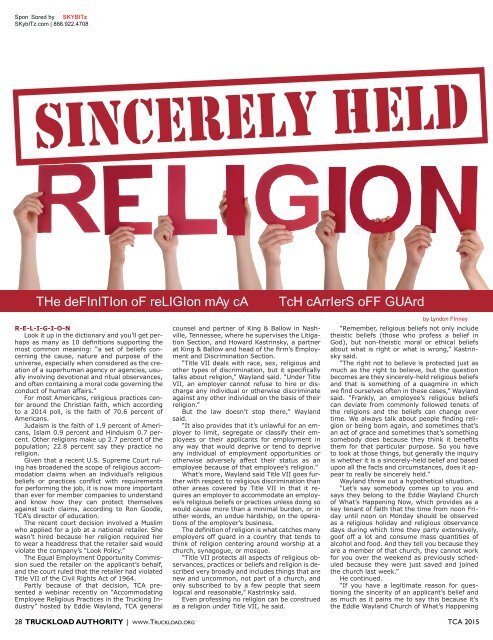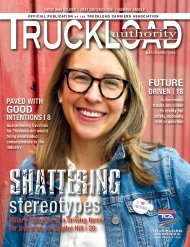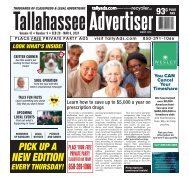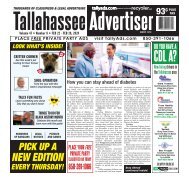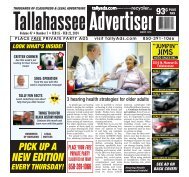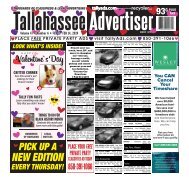Truckload Authority - Fall 2015
We take you inside the twin 33 debate and the CDL scandal that rocked California. Plus, you will meet a true American hero. It's all in this edition
We take you inside the twin 33 debate and the CDL scandal that rocked California. Plus, you will meet a true American hero. It's all in this edition
Create successful ePaper yourself
Turn your PDF publications into a flip-book with our unique Google optimized e-Paper software.
Sponsored by SKYBITz<br />
SKYBITz.com | 866.922.4708<br />
Sincerely Held<br />
The definition of religion may catch carriers off guard<br />
R-E-L-I-G-I-O-N<br />
Look it up in the dictionary and you’ll get perhaps<br />
as many as 10 definitions supporting the<br />
most common meaning: “a set of beliefs concerning<br />
the cause, nature and purpose of the<br />
universe, especially when considered as the creation<br />
of a superhuman agency or agencies, usually<br />
involving devotional and ritual observances,<br />
and often containing a moral code governing the<br />
conduct of human affairs.”<br />
For most Americans, religious practices center<br />
around the Christian faith, which according<br />
to a 2014 poll, is the faith of 70.6 percent of<br />
Americans.<br />
Judaism is the faith of 1.9 percent of Americans,<br />
Islam 0.9 percent and Hinduism 0.7 percent.<br />
Other religions make up 2.7 percent of the<br />
population; 22.8 percent say they practice no<br />
religion.<br />
Given that a recent U.S. Supreme Court ruling<br />
has broadened the scope of religious accommodation<br />
claims when an individual’s religious<br />
beliefs or practices conflict with requirements<br />
for performing the job, it is now more important<br />
than ever for member companies to understand<br />
and know how they can protect themselves<br />
against such claims, according to Ron Goode,<br />
TCA’s director of education.<br />
The recent court decision involved a Muslim<br />
who applied for a job at a national retailer. She<br />
wasn’t hired because her religion required her<br />
to wear a headdress that the retailer said would<br />
violate the company’s “Look Policy.”<br />
The Equal Employment Opportunity Commission<br />
sued the retailer on the applicant’s behalf,<br />
and the court ruled that the retailer had violated<br />
Title VII of the Civil Rights Act of 1964.<br />
Partly because of that decision, TCA presented<br />
a webinar recently on “Accommodating<br />
Employee Religious Practices in the Trucking Industry”<br />
hosted by Eddie Wayland, TCA general<br />
counsel and partner of King & Ballow in Nashville,<br />
Tennessee, where he supervises the Litigation<br />
Section, and Howard Kastrinsky, a partner<br />
at King & Ballow and head of the firm’s Employment<br />
and Discrimination Section.<br />
“Title VII deals with race, sex, religious and<br />
other types of discrimination, but it specifically<br />
talks about religion,” Wayland said. “Under Title<br />
VII, an employer cannot refuse to hire or discharge<br />
any individual or otherwise discriminate<br />
against any other individual on the basis of their<br />
religion.”<br />
But the law doesn’t stop there,” Wayland<br />
said.<br />
“It also provides that it’s unlawful for an employer<br />
to limit, segregate or classify their employees<br />
or their applicants for employment in<br />
any way that would deprive or tend to deprive<br />
any individual of employment opportunities or<br />
otherwise adversely affect their status as an<br />
employee because of that employee’s religion.”<br />
What’s more, Wayland said Title VII goes further<br />
with respect to religious discrimination than<br />
other areas covered by Title VII in that it requires<br />
an employer to accommodate an employee’s<br />
religious beliefs or practices unless doing so<br />
would cause more than a minimal burden, or in<br />
other words, an undue hardship, on the operations<br />
of the employer’s business.<br />
The definition of religion is what catches many<br />
employers off guard in a country that tends to<br />
think of religion centering around worship at a<br />
church, synagogue, or mosque.<br />
“Title VII protects all aspects of religious observances,<br />
practices or beliefs and religion is described<br />
very broadly and includes things that are<br />
new and uncommon, not part of a church, and<br />
only subscribed to by a few people that seem<br />
logical and reasonable,” Kastrinsky said.<br />
Even professing no religion can be construed<br />
as a religion under Title VII, he said.<br />
By Lyndon finney<br />
“Remember, religious beliefs not only include<br />
theistic beliefs (those who profess a belief in<br />
God), but non-theistic moral or ethical beliefs<br />
about what is right or what is wrong,” Kastrinsky<br />
said.<br />
“The right not to believe is protected just as<br />
much as the right to believe, but the question<br />
becomes are they sincerely-held religious beliefs<br />
and that is something of a quagmire in which<br />
we find ourselves often in these cases,” Wayland<br />
said. “Frankly, an employee’s religious beliefs<br />
can deviate from commonly followed tenets of<br />
the religions and the beliefs can change over<br />
time. We always talk about people finding religion<br />
or being born again, and sometimes that’s<br />
an act of grace and sometimes that’s something<br />
somebody does because they think it benefits<br />
them for that particular purpose. So you have<br />
to look at those things, but generally the inquiry<br />
is whether it is a sincerely-held belief and based<br />
upon all the facts and circumstances, does it appear<br />
to really be sincerely held.”<br />
Wayland threw out a hypothetical situation.<br />
“Let’s say somebody comes up to you and<br />
says they belong to the Eddie Wayland Church<br />
of What’s Happening Now, which provides as a<br />
key tenant of faith that the time from noon Friday<br />
until noon on Monday should be observed<br />
as a religious holiday and religious observance<br />
days during which time they party extensively,<br />
goof off a lot and consume mass quantities of<br />
alcohol and food. And they tell you because they<br />
are a member of that church, they cannot work<br />
for you over the weekend as previously scheduled<br />
because they were just saved and joined<br />
the church last week.”<br />
He continued.<br />
“If you have a legitimate reason for questioning<br />
the sincerity of an applicant’s belief and<br />
as much as it pains me to say this because it’s<br />
the Eddie Wayland Church of What’s Happening<br />
28 <strong>Truckload</strong> <strong>Authority</strong> | www.<strong>Truckload</strong>.org TCA <strong>2015</strong>


